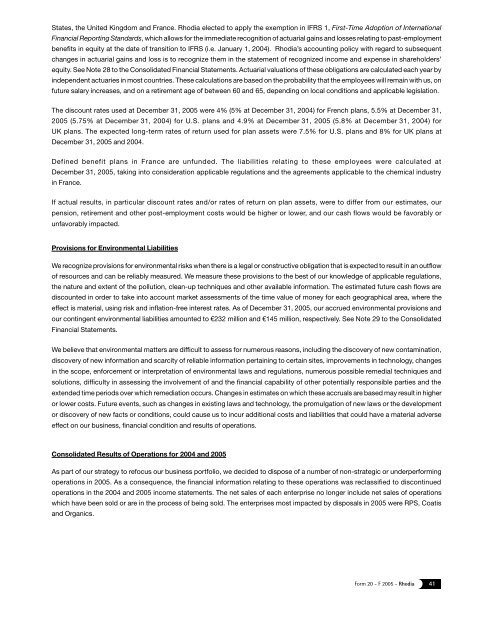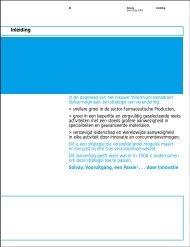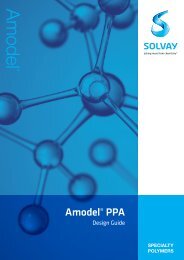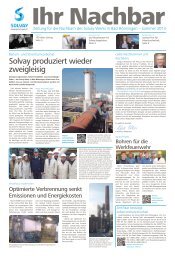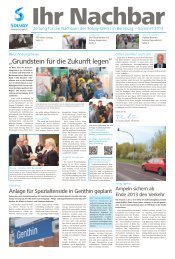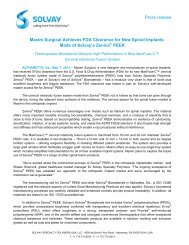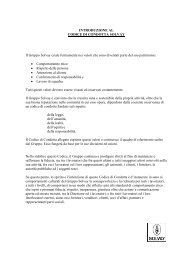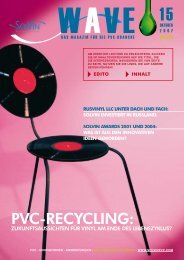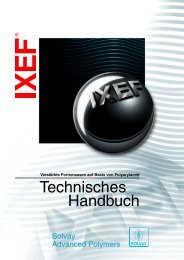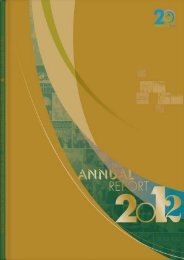Form 20-F 2005
Form 20-F 2005
Form 20-F 2005
You also want an ePaper? Increase the reach of your titles
YUMPU automatically turns print PDFs into web optimized ePapers that Google loves.
States, the United Kingdom and France. Rhodia elected to apply the exemption in IFRS 1, First-Time Adoption of International<br />
Financial Reporting Standards, which allows for the immediate recognition of actuarial gains and losses relating to past-employment<br />
benefits in equity at the date of transition to IFRS (i.e. January 1, <strong>20</strong>04). Rhodia’s accounting policy with regard to subsequent<br />
changes in actuarial gains and loss is to recognize them in the statement of recognized income and expense in shareholders’<br />
equity. See Note 28 to the Consolidated Financial Statements. Actuarial valuations of these obligations are calculated each year by<br />
independent actuaries in most countries. These calculations are based on the probability that the employees will remain with us, on<br />
future salary increases, and on a retirement age of between 60 and 65, depending on local conditions and applicable legislation.<br />
The discount rates used at December 31, <strong>20</strong>05 were 4% (5% at December 31, <strong>20</strong>04) for French plans, 5.5% at December 31,<br />
<strong>20</strong>05 (5.75% at December 31, <strong>20</strong>04) for U.S. plans and 4.9% at December 31, <strong>20</strong>05 (5.8% at December 31, <strong>20</strong>04) for<br />
UK plans. The expected long-term rates of return used for plan assets were 7.5% for U.S. plans and 8% for UK plans at<br />
December 31, <strong>20</strong>05 and <strong>20</strong>04.<br />
Defined benefit plans in France are unfunded. The liabilities relating to these employees were calculated at<br />
December 31, <strong>20</strong>05, taking into consideration applicable regulations and the agreements applicable to the chemical industry<br />
in France.<br />
If actual results, in particular discount rates and/or rates of return on plan assets, were to differ from our estimates, our<br />
pension, retirement and other post-employment costs would be higher or lower, and our cash flows would be favorably or<br />
unfavorably impacted.<br />
Provisions for Environmental Liabilities<br />
We recognize provisions for environmental risks when there is a legal or constructive obligation that is expected to result in an outflow<br />
of resources and can be reliably measured. We measure these provisions to the best of our knowledge of applicable regulations,<br />
the nature and extent of the pollution, clean-up techniques and other available information. The estimated future cash flows are<br />
discounted in order to take into account market assessments of the time value of money for each geographical area, where the<br />
effect is material, using risk and inflation-free interest rates. As of December 31, <strong>20</strong>05, our accrued environmental provisions and<br />
our contingent environmental liabilities amounted to €232 million and €145 million, respectively. See Note 29 to the Consolidated<br />
Financial Statements.<br />
We believe that environmental matters are difficult to assess for numerous reasons, including the discovery of new contamination,<br />
discovery of new information and scarcity of reliable information pertaining to certain sites, improvements in technology, changes<br />
in the scope, enforcement or interpretation of environmental laws and regulations, numerous possible remedial techniques and<br />
solutions, difficulty in assessing the involvement of and the financial capability of other potentially responsible parties and the<br />
extended time periods over which remediation occurs. Changes in estimates on which these accruals are based may result in higher<br />
or lower costs. Future events, such as changes in existing laws and technology, the promulgation of new laws or the development<br />
or discovery of new facts or conditions, could cause us to incur additional costs and liabilities that could have a material adverse<br />
effect on our business, financial condition and results of operations.<br />
Consolidated Results of Operations for <strong>20</strong>04 and <strong>20</strong>05<br />
As part of our strategy to refocus our business portfolio, we decided to dispose of a number of non-strategic or underperforming<br />
operations in <strong>20</strong>05. As a consequence, the financial information relating to these operations was reclassified to discontinued<br />
operations in the <strong>20</strong>04 and <strong>20</strong>05 income statements. The net sales of each enterprise no longer include net sales of operations<br />
which have been sold or are in the process of being sold. The enterprises most impacted by disposals in <strong>20</strong>05 were RPS, Coatis<br />
and Organics.<br />
<strong>Form</strong> <strong>20</strong> - F <strong>20</strong>05 - Rhodia<br />
41


